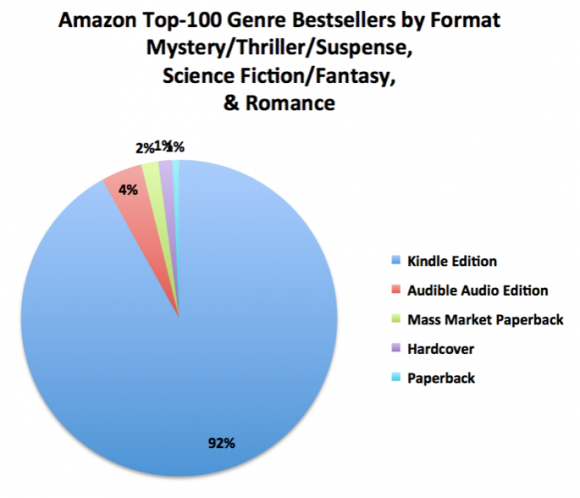aNewDomain — Writing is a tough gig these days.
— Writing is a tough gig these days.
Amazon has millions of titles, a number so large it is hard to narrow down with exactitude. I’ve seen 1.5 million and 32 million and numbers even larger. When you write and publish a book, how are you to get it in front of potential readers?
The Amazon Kindle and other e-readers have made it possible to bypass traditional publishing and go straight to virtual press. There is no cost and thus no real risk to the author. Unless you consider being buried in obscurity a risk.
Thus, millions of titles.
If you’re lucky enough and good enough to get picked up by a major publishing house, you’ll have to negotiate an advance. You’ve got a choice, now. If you ask for too much, they’ll back out of the deal.
 If you ask for too little, though, they might consider it a no-risk freebie. Put it out, see how it does. You have to get just enough of an advance that they have a chance of earning it back – or no second book for you – and also enough that the house feels they have something on the line. That’s what makes them invest in marketing and promotion.
If you ask for too little, though, they might consider it a no-risk freebie. Put it out, see how it does. You have to get just enough of an advance that they have a chance of earning it back – or no second book for you – and also enough that the house feels they have something on the line. That’s what makes them invest in marketing and promotion.
As a self-publisher, you’re on your own for all that. Most of the marketing legwork was going to be yours anyway, but now all of the marketing is.
And that’s tough.
Most of us don’t write because we’ve got it easy. We can’t, by and large, afford to invest a couple of thousand bucks into a book that is going to earn a couple of hundred.
So we do anything at all to get visibility. Often that results in our getting scammed.
The most tragic result, maybe, is our participation in our own devaluation in the e-book market.

There’s a lot of pressure to release your books for free or for 99 cents. Often, writers will issue the first book in a series for this price and the next books for a little more. But really a tiny percentage of those 32 million books is sold for a real price. Your George Martins and your Stephen Kings can get retail. The rest of us start at deep discount and move down to free.
Here’s the thing: all this might be totally counter-productive.
Let’s say we set up shop at a bake sale.
Over here, we have cookies for 50 cents.
Over here, we have cookies for $2.
Which is the better cookie? When we do this experimentally, people overwhelmingly respond that the $2 cookie is better – even though they are the same cookies. In other words, you get what you pay for. You know it’s true and you make it true.
Even trained wine experts rate wine better if it’s in a pricier bottle.
So by issuing all these books, we devalue them and us. A 99-cent book is only worth 99 cents.
Worse, we devalue books. Because we get used to reading books for free or for so cheap as to make no difference, we start to think all books are without much value. Just weekend entertainments, throw-aways.
My library is full of books. I treasure them, some of them I treasure like Sméagol treasures his magic ring. They have weight, gravity. And value.
With my new book, For Love of Their Children, I have this dilemma: whether to release the book only between covers, or also as a file readable by Kindles or Nooks. Now I worked a long time, invested a great deal into this book.
And I’m struggling to make it known that it exists among those millions of other titles.
But am I struggling enough to offer it for next to nothing?
For aNewDomain, I’m Jason Dias.
Image one: AuthorEarnings.com, All Rights Reserved; image two of George RR Martin on the set of HBO’s “Game of Thrones”: USAToday.com, All Rights Reserved: image three: SPCollege.libguides.com; All Rights Reserved.
Cover image of a home library: Pinterest.com/explore/home-libraries.













